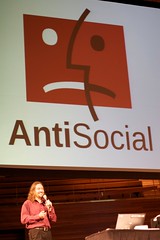 Two more articles sitting in my backlog of thoughtful pieces. Enterprise 2.0 prides itself on social business and collaboration. But when the basic model of providing tools doesn't work, and when the HR models of organization don't work, we have a long way to go.
Two more articles sitting in my backlog of thoughtful pieces. Enterprise 2.0 prides itself on social business and collaboration. But when the basic model of providing tools doesn't work, and when the HR models of organization don't work, we have a long way to go.
The Big Failure of Enterprise 2.0 by Laurie Buczek really got me going on how we don't put thought into how we expect people to USE the tools we give them. And then we don't provide the capabilities and integration that makes sense.
Laurie goes into more detail, but one idea that stuck in my head
This time, one of them inspired an all-too-obvious thought: can we really be ready for "social business" if the default collaboration platform is email, when email doesn't provide true integration into all the social media offerings out there? And in the most obvious example: have you seen the profile that appears when you use outlook at look up a person's information? It's a dialog box with a bunch of data (usually from LDAP). Hopefully it comes pre-populated with useful information and provides a mechanism for you to update things like your mobile phone number.
What's the problem with this? It's a STATIC dialog box. The only thing you can do is copy the contact information into your local contacts list. No links to activities on other services within the company. Certainly no links to what that person has been doing or saying outside the company. No context. Why not make this THE profile and make it an active PAGE that aggregates activities; gives people a place to be on the intranet? (Yes, I have heard about Outlook Social Connector. But I haven't heard much in the way of adoption.)
The other piece is Jon Husband's thoughts on Why E2.0 and Social Business Initiatives Are Likely to Remain Difficult, where he gets going on definitions. In short, if organizations continue to describe and rate roles based on old ways of thinking, knowledge work - and by extension any work that is "social business" - will continue to get marginalized. Knowledge work won't become understood until we redefine "contribution" to organizations (and therefore compensation) to include generating value through collaboration, rather than strictly through a narrow definition of expertise. I found this an interesting combination of the thinking represented in Laurie's piece on how organizations go about providing social software, and how organizations go about ranking/rating knowledge workers.
[Photo: (untitled image from a conference, loved the slide above the speaker) by Michael Davies]